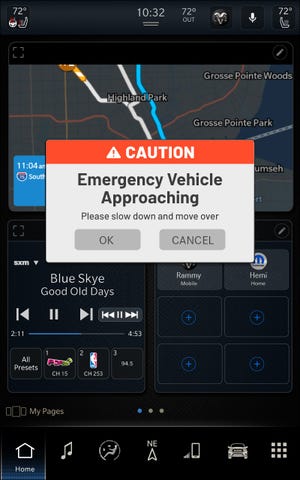
As many as 4 million drivers are about to become safer, thanks to an over-the-air software update Stellantis will send to their vehicles — at no cost — in January.
The Jeep, Ram, Dodge and Fiat and Alfa Romeo vehicles will receive alerts when they near an emergency vehicle with its flashers lit. The feature, called the Emergency Vehicle Alert System (EVAS), will initially be available in North America, but Stellantis could roll it out across the 14 brands the automaker sells around the world.
A record 63 U.S. emergency responders were killed in crashes last year, according to the Emergency Responder Safety Institute.
“It’s all about saving lives,” said Mamatha Chamarthi, Stellantis head of software business and product management.
The feature was born in a 2020 meeting where Chrysler group employees pitch new ideas. “An employee was driving with her kids,” Chamarthi said. “It was noisy in the vehicle. She didn’t hear an approaching emergency vehicle and was nearly involved in an accident.
“She asked why we couldn’t have an alert system that shows the kind of emergency vehicle, and the direction it’s coming from?”
Stellantis moved fast, using existing connectivity hardware and working with Safety Cloud creator HAAS Alert, which works with more than 1,000 emergency responder fleets in the U.S., Canada and Mexico.
Chamarthi tested EVAS in her plug-in hybrid Jeep Wrangler last summer.
“The system knows the location of the first responder, and it knows where our vehicle is,” she said. Alerts are geofenced. It only notifies drivers of nearby emergency vehicles and disregards those on the opposite-direction side of divided highways.
Thousands of accidents every year
A study by the University of Minnesota found that emergency-vehicle alerts reduce the likelihood of accidents 90%. Vehicle-related incidents are the second-leading cause of deaths among U.S. firefighters and law enforcement officers. Thousands more injuries occur when vehicles hit first responders or their vehicles.

EVAS operates like the weather advisories many vehicles already receive. A message on the instrument panel or touch screen advises of the type of emergency vehicle and what direction it’s in. Unlike current alerts that notify drivers of roadside disabled vehicles ahead, EVAS also warns drivers about emergency vehicles approaching from behind.
Either way, the driver can move over and slow down to let the first responders do their work safely. EVAS will be available in 2018 and later models with the Uconnect 4 or 5 infotainment system and a connection to Stellantis’s safety and convenience data services, which start at $12.99 a month. The vehicles will receive the feature in a free over-the-air update in the next few weeks.
Stellantis will launch EVAS at the CES electronics show Jan. 5-8 in Las Vegas.
Founded in 2015, HAAS already supplies the information to Waze, the Google navigation app that provides routing and real time traffic updates. HAAS has delivered more than a billion alerts to Waze users.
More features coming
“Stellantis is the first automaker to build this into their vehicles,” HAAS Director of Communication Brock Aun said. “We’re talking to other companies.” Many emergency vehicle manufacturers also build Safety Cloud connectivity into their vehicles. Aftermarket kits can make others compatible.
Stellantis is the first automaker to offer the system, but more than 1,000 emergency responder fleets in the U.S., Canada and Mexico already participate in the Safety Cloud, which tracks the vehicles.
“As the first global automaker to join Safety Cloud, Stellantis is making roads safer for their customers, and for the millions of emergency responders and roadway workers we all share the road with every day,” HAAS CEO Cory Hohs said. “We’re proud to partner with Stellantis in this transformative step towards a safer and smarter future in transportation.”

Stellantis plans to add features to EVAS over time. The first may be a vibration in the steering wheel when an emergency vehicle approaches. After that, vehicles with handsfree highway driving assistance may change lanes automatically to avoid emergency vehicles, as long as the neighboring lane is open.
“We believe this is important to the safety of our owners,” Chamarthi said.